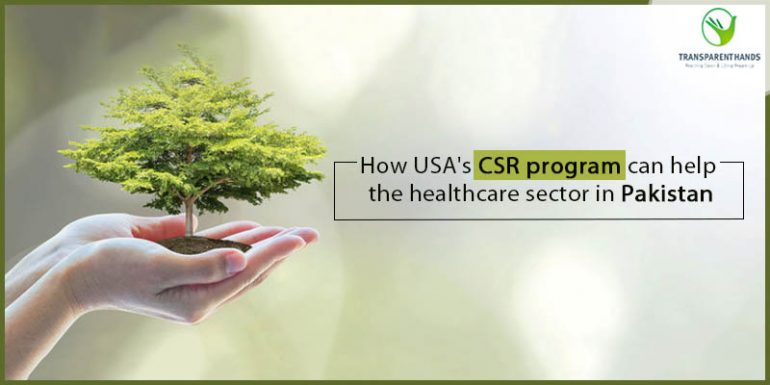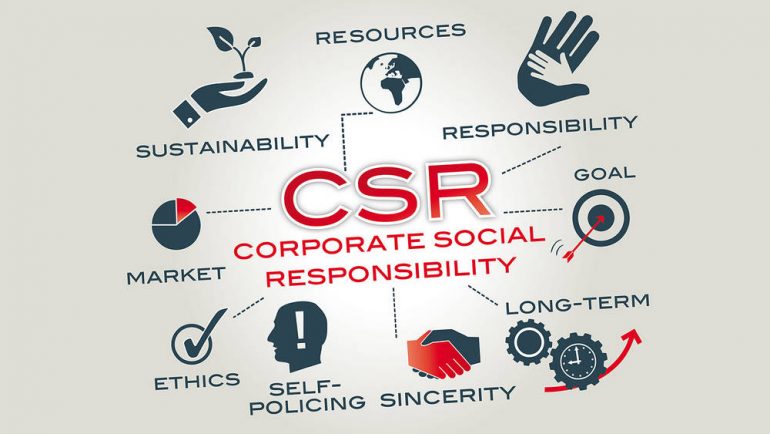How USA’s CSR Program Can Help HealthCare Sector in Pakistan

CSR In USA:
Corporate Social Responsibility is one of the most vital gauges that can be used to measure the worth of any company and its contribution towards the nation and humanity. Thus decision making and execution should always be in synchrony with moral principals and values. How USA’s CSR Program Can Help HealthCare Sector in Pakistan.
In the USA the CSR programme is undefined and often gets confusing. The US companies are not regulated as heavily as those in other developed countries, and corporate responsibility is not addressed as a regular compliance issue but rather from a social and moral choice perspective.
While stakeholders expect that companies adopt more sustainable business practices that benefit people and society in addition to profits growing, the fact remains that US companies are not obliged to participate because of noncompulsory corporate responsibility practices. Corporate activities fringed with corporate responsibility in the US go beyond environmental, legal and workplace issues to ones that best enhance a company’s external reputation.
Related Article : Must read
-> Top most CSR Developments in Saudi Arabia
Aron Cramer Chief Executive of Business for Social Responsibility says “Companies are moving beyond philanthropy and endeavors to look at corporate responsibility as a driver of innovation and competitiveness. Corporate social responsibility can be understood as the continuing commitment by businesses to behave ethically and contribute to economic development while improving the quality of life of the workforce and their families as well as of the local, community and society at large.”
CSR can create consumer trust, increases sales, strengthen brand image, create employee morale and attract employees, therefore, CSR becomes more widely understood, accepted and practiced within mainstream companies in the US.
How CSR Can Help Health Sector in Pakistan:
Healthcare in Pakistan is still in the early stages of development. And a weak health system underlies the poor health status of the population. Other issues include low health manpower levels, a lack of training on the use of medical equipment. The situation worsens as much of this equipment are poorly maintained or misused and the primary health facilities are underutilized.
The United States Agency for International Development (USAID), is primarily responsible for administering both local and foreign aid. Over the last six years, USAID has provided 9.4 million women and children with maternal, child and reproductive health care services in Pakistan. Thay have trained more than 50, 000 people on new healthcare inventions for women and children. They have supported governments in Sindh ,Punjab, Baluchistan, and Khyber Pakhtunkhwa to set aside $97 million of health funding to meet women’s family planning needs.
Export.gov reported, “With the number of hospitals, dispensaries, healthcare units expected to increase owing to the Government of Pakistan’s plans of expanding the healthcare network. Market demand for medical equipment listed below is expected to grow in the upcoming years:
a – Respirators (HS 9019)
b – Monitors, Ventilators,
c – Dental Veterinary Instruments and Appliances (HS 9018)
d – Orthopedic Appliances Hearing Aids (HS 9021)
e – X Rays, Radiograph/Radio Therapy Apparatus (HS 9022) etc.”
Government agencies are never sufficient to deal with or address a social problem, hence, private companies must show up. USA Healthcare Services and medical equipment are generally well received in Pakistan and known for high quality. But local agents in the market are often seeking low cost and lack of quick decision making on terms which can put American companies at a disadvantage. Now that US medical services are high in demand in Pakistan, healthcare and pharmaceutical companies located in the US must set up a CSR strategy to capture the market and grow up greater in this region.
Conclusion:
According to a study by Reputation Institute, a private global consulting firm based in New York, our willingness to buy, recommend, work for, and invest in a company is driven 60% by our perceptions of the company or its reputation and only 40% by our perceptions of the products or services it sells. People’s willingness to trust, admire and feel good about a company is based on their perceptions of the corporate social responsibility of the company. CSR is a core element of reputation and can be used to help establish trust and goodwill amongst the stakeholders.
One company that has been exemplary in its CSR initiatives is Unilever . Their CSR program titled as the Unilever Sustainable Living Plan, has covered a wide domain of areas that has considerably impacted the society and the underprivileged people.
Through the Unilever Pakistan’s Sustainable Living program, Unilever had reached 6.2 million people in the year 2010. In their health and hygiene program, they have managed to reach approximately 5.2 million people. Under their Nutrition Program, 82,608 meals were provided to the World Food Program. They also took part in flood rehabilitation programs by contributing Rs.2. 43 million towards flood relief and rehabilitation work in Pakistan.
The relevance and importance of the Unilever Sustainable Living Plan in driving a responsible business model and helping to accelerate the growth and profitability of the company. Unilever Annual Reports and Accounts 2016 Highlights showed,that it has outperformed markets with 60% of the business gaining share. According to the Director’s report of Unilever Pakistan, there were a massive 10% underlying sales growth and 4% earnings per share.
Many companies have envisaged CSR along with a spectrum which ranges from giving because it is the right thing to do. Crafting CSR programs that reflect company’s business values while addressing social, humanitarian and environmental challenges is considered to be the appropriate strategy. CSR programs are designed to boost brand reputations and at present, the idea of creating shared value has found appeal. CSR concept rests on the ability of a company to create private value for itself and in turn, creates public value for society.











Leave Your Comments